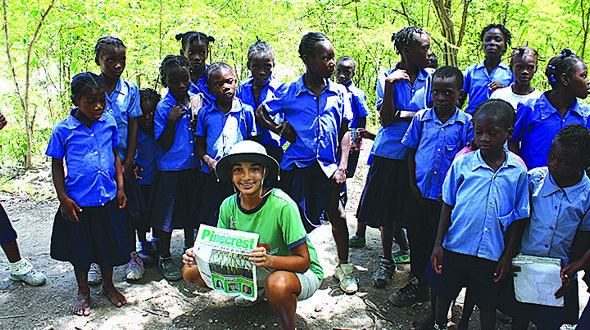
What began as an ambitious seventhgrade service project for Westminster Christian student Sidney Kissane ended up as a week-long trip she and her mother, Vivianne, took to Damye Gesse, an impoverished mountainside Haitian village to distribute $4,400 worth of food to thousands of residents.
The trip – their first ever to the country – was arranged through Literacy for Haiti, an organization that has been involved with the Haitian community for 20 years. Sidney initially was drawn to the cause when a relative — organization founder Cliff Matousek — and the village leader visited the U.S. and was a guest at the Kissane in Pinecrest.
“They showed me pictures of their village and they told me about how everything was there,” Sidney says. “That made me really want to help, because I know that I have life really good here. It made me realize that there are people who have life much worse than really bad. It was awful, the poverty they were living in.”
With the support of her teacher, Levi Nolander, Sidney organized basketball and jump-rope activities, soliciting sponsorship from donors. She was able to get more than 80 people involved. Vivianne, who has been involved with LFH for five years, had initially intended to go to Haiti alone. Sidney convinced her otherwise.
“At first she was going to go by herself, but then I noticed how much more we accomplished in the fundraising than I expected and how big of a project this actually was,” Sidney says. “I wanted to see how the money we raised helped, and it did way more than I expected.”
They arrived in Port au Prince on June 10, bringing with them more than $400 worth of baby formula. After picking up their order of Plumpy Nut, a nutrient-dense product closely resembling peanut butter that is used by international relief organizations, they left for Damye.
While visiting, they stayed in a house that Matousek built. There was no electricity, running water or glass in the windows and they used rainwater caught in a cistern for drinking and bathing, operating at night by candlelight and making use of an outhouse when nature called. “We had the nicest house in the village,” Sidney recalls.
Sidney traveled daily through the village doling out Plumpy Nut. She and her mother also distributed goods from a primitive health clinic within the village. The only other available medical facility was a small hospital at the mountain base five miles away.
One of Literacy for Haiti’s main projects is a microloan program that offers up to $100 to villagers for use toward seed purchases, living expenses, small businesses or school fees for children, which costs $3 a month. Those accepting the loan are required to pay it back throughout the year at a five percent interest. Loan profits are put directly back into supporting the only school in the village, the Martin Luther King Jr. School, which has classes from preschool to sixth grade, employs six teachers and serves more than 380 children.
Meantime, Vivianne has begun developing her own project, Kids for Kids, which provides funds to buy baby goats for families in the village.
“The goats are very much a part of their culture already, and if a family has a goat they’re pretty well off,” she says. “The kids of the family raise it and then sell it and they’ll be able to live for a period of time off of the money.”
Through their joint efforts, Vivianne and Sidney have provided enough Plumpy Nut to feed villagers for the next couple of months. They also intend to Haiti and stay for a longer time.
“Even with all that we did, we see that this is just a Band Aid on the problem, a stopgap,” says Vivianne. “It showed us we were able to help out, but it also showed us how much more of a need there is.”
For information, go to www.christianpages.org/LiteracyforHaiti






